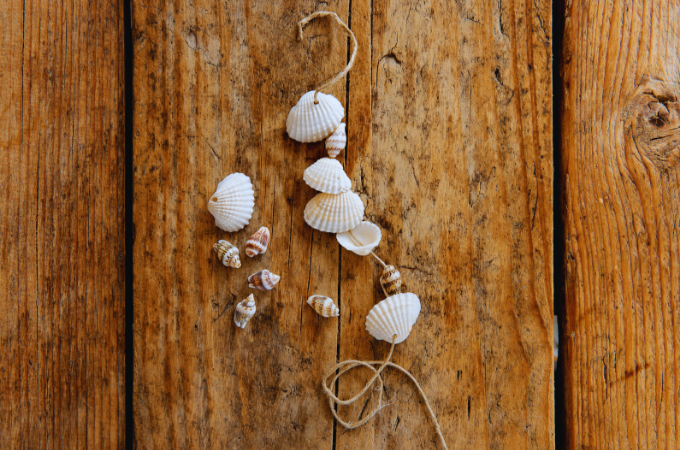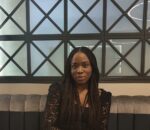
Mama crawls into your space in our bed. Next to me, she smells like the oil she has been frying catfish in. Her warm hands pull me in closely; her feet are cold, and she whispers, “Nne, talk to me.” Every night this scene unfolds, she enters my bed and holds me. She holds me as though I am a seven-year-old who has awoken from a nightmare and is convinced the clothes on the line are monsters. But there are no monsters here, only life, but that is nightmare enough.
Mama holds me and recites in Igbo. It sounds like a psalm, but I wonder why she would know a psalm in Igbo; she cannot read Igbo. But it appears she has because she repeats the verses about freedom from the jaw of the enemy, until her grip on me is overtaken by her gentle snores. I cannot memorise psalms as an adult; the only ones I know are the ones she taught us in primary school. I roll over and look out the window; I see Mama’s wrapper, pegged on the line, dancing in the wind. I am tempted to walk outside and dance with the wrapper serenaded by the songs of crickets.
Whenever I think of dancing, I remember the first day we met. You danced with me and lifted me like I was the sun in a solar system of forgotten stars. “I want to dance with you forever,” you said. I wanted the same, but how do I say that to a man I just met? How do I admit such eager desire? I didn’t know what to say, so I said nothing, moving with you as we danced in silence; my lips quivered as I looked away from your eyes. I don’t know who made chemistry, but I wanted to tell them thank you for how the entirety of you pierced through me that night on the dance floor.
The soothing, silent sound of the night reminds me of my childhood when Mama took Tobe and me to the beach at night. The smell of our city, that of rotten fish soaked in urine, was absent. I was unsure what to make of it. That night, we spent our time in a makeshift hut overlooking the Atlantic Ocean. I told my mother I wanted to make a necklace from seashells. Mama agreed and dug out her sewing kit; she was always prepared. The necklace, a gargantuan display of shells and stones stuck together by glue and threads, sat next to the remote on the television stand for weeks. “My daughter made it,” she announced with a grin to every visitor who dared darken our doorstep.
Like that circular necklace, I chase my tail slowly, and Mama wants to know what I am doing. She asks why I walk around with aimless eyes and feet that drag on the floor with no eagerness. She says I walk as though I was in a burial procession. Mama has many questions. I have no answers. I have only questions.
“Nne, you are too tired,” Mama complained weeks ago. I wore the same clothes, black and grey, grief-stricken.
“Yes, Mama. I am tired,” I whispered.
“You cannot be tired.” She leaned in, placed her warm lips on my cold ears, and whispered, “My daughter, tiredness must not become a sickness. Remember how you were as a child? Nne, you are relentless. You should change your job,” Mama said as she ended her charge. She warned that a job that permitted me to wear grey and black sweatpants defeated the purpose for which a woman had a career. I ignored her; you taught me to do that.
I do not know which identity is mine. I ask myself if I am truly relentless. I am unlike my mother, whose identity and motivation are the survival of her children. The night before I left for boarding school as a teenager, my mother called me to the kitchen when the house was asleep, and I could taste the bitterness in the air from generator smoke.
“Nne, do not get pregnant,” Mama tugged on her right earlobe.
“Ma?” I questioned, confused.
“If you get pregnant, you will destroy life for everybody. Your brother needs you to succeed, be a good example. Do you hear me?”
I heard her, but I did get pregnant. You were not surprised when I recalled this story to you; as a childless twenty-seven-year-old woman, you said unwanted children do not happen to the privileged. They happen to the poor and those who cannot exploit choice. Then, I was a fifteen-year-old who knew nothing about motherhood. Mama agreed, and we chose me instead. This time, I thought I had walked in with both feet, but I think I kept one eye closed.
“There will be other babies,” Mama said yesterday.
“You said that the last time,” I said, holding back my tears as my womb contracted within me.
“And I was right. This loss is freedom in disguise,” Mama said. She is insistent, picking her words carefully for emphasis, afraid of releasing the threads in my love for you.
We cannot choose our mothers, and mine is a motivational speaker. She attempts to pull her daughter out of the ground that sinks beneath her feet. But no one has battled sinking sand and won. I, too, wanted to be like her, a relentless mother admired by her daughter. The relentless version of me that was motivated by fear has since disappeared. I am content with being mediocre and alive; after all, days are marathons, and years are sprints. Mornings are the hardest.
This morning, I attended Sarah’s baby shower. As I pulled my dress from the closet, the smell of burning wood and roasted coffee beans energised me. It was you, your fragrance. I painted my face the way Mama likes, with minimal blush and no drawn eyebrows. I slipped into my dress and called you to complete my zip. I called your name again, but you were not there, yet you were. The scent of you in our room suddenly sent shivers down my spine. I remembered how I was always filled with you, empty, eager, and always wanting more. Sarah called four weeks ago to say she was pregnant and asked me to save the date for her shower. I wrote a cheque, but Mama insisted I attend to smile and eat a slice of cake. I ate the cake and reminisced about the taste of sweetness; I asked myself if all things go through fire to become sweet. You said love was the pearl in an oyster, the diamond from a rock; both need pain and burning, like the wire in my jaw or cement in my thigh. This is what I think of when my mother drapes her arms around me, her attempt to soothe the scars I cannot see.
But such things do not apply to human bones; broken bones do not become stronger; they fracture along fault lines. Mama holds me as though she is trying to prevent the soft, broken pieces in my heart from eventually turning to stone. I don’t know why I was attracted to broken things, shells on a beach and broken branches with dying leaves. Mama blames herself and says she should have told me to turn from weary things. But she nurtured me well; all I wanted to do was heal and bind your broken wings. I can see now that it was the hidden, broken pieces of light within me I had been trying to fix all along.
“Do you hear me?” he said, a beam of light reflected between his face and mine. You once told me the difference between refraction and reflection. But I do not remember the difference.
“I–” I attempted to respond but could not speak. The word spluttered out of me like a chicken on its final cluck.
“Squeeze my hands if you can hear me?” he said as he encouraged me. I gave a gentle squeeze, and he squeezed it back.
The first day you held my hand was soft and electric. I chased that flutter that turned my legs to jelly, though the quiver in my heart told me I should run. “How did this happen?” he said, but he was our neighbour, and from the thinness of our walls, I know he knew the answer. I think he was questioning himself and not me. He was our silent neighbour who heard us at night interpreting our punk rock as a classical melody. He waved hello in the mornings, attributing youthful exuberance as passion in disguise. That day, my morning started with the taste of coffee making me sick and an idea from Mama to pee on a stick. Mama had always prayed for the day when I would hold my daughter and protect her jealously, but when she met you, she stopped such prayers. Her own jealous protection kicked in.
How does a thirty-year-old woman surprise a man with a baby? She does not. They say the signs are always there, and rose-tinted glasses are red flags in disguise. Like our neighbour attributing the purple parts of me over the years to passion and love. Or me telling Mama she was too hard and I was the soft one who would make you want things you did not desire. That morning, I eagerly flashed the positive stick to you, and the purple hue of our chemistry made my eyes go blue. But who flew down the stairs first? Was it me or the stupid stick?










COMMENTS -
Reader Interactions